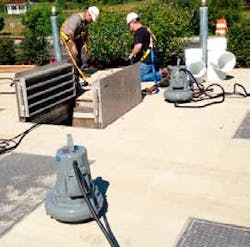The Turning Stone Resort and Casino, 30 miles east of Syracuse, NY, is a destination golf and entertainment complex owned and operated by the Oneida Nation. Turning Stone owns and maintains the sewage collection system within its property boundaries. The resort’s main pump station moves the wastewater to a collection line built by the Town of Verona and ultimately discharges to the municipal wastewater treatment plant operated by the City of Oneida.
Scope
As part of a recent expansion that added three new clubs and a restaurant to the popular resort, the facility upgraded its main lift station to keep up with increased demand.
The upgraded lift station included four pumps sized to handle peak flows of 600 gallons per minute (gpm). However, the successful new restaurants and clubs brought with them a flow of fats, oil and grease (FOG), which gelled into a floating blanket atop the main station’s wet well, where the sewage flows converge from the network of smaller stations throughout the property boundaries.
“The blanket of FOG would congeal and build up until the floats were prevented from activating the pumps at our main lift station,” said Bill Hollenbeck, manager of the 90-person Turning Stone facilities department. “The risk of a blockage or sewer overflows that could shut down restrooms off the gaming floor or cause a stench were obviously intolerable in a 24/7 operation.”
Hollenbeck adopted daily inspections of the wet wells and had the main pump station cleaned out twice each week by an outsource contractor with a vacuum truck, but he recognized that these measures were only an interim—and costly—solution.
Solution
Hollenbeck reached out to the Flygt pump regional office of Xylem, Inc. Although the pumps at the main station were from another manufacturer, Turning Stone had experienced reliable performance from a wide range of Flygt pumps in lift stations elsewhere in the resort’s collection system.
“We projected that our costs could run up to $50,000 a year,” Hollenbeck said. “We started looking for a better longterm solution.”
The Flygt engineering team recommended upgrading the main lift with a series of Flygt technologies, including the
Flygt N-technology impeller, a Mix-Flush valve, and control enhancements. The existing float-actuated controls were left in place as redundant backups.
Flygt developed its advanced N-technology impeller to address the growing challenges of today’s higher debris wastewater flows. The N impeller handles solids even more efficiently than a chopper pump, and when installed with a Flygt pump’s high-efficiency motor, it can shave energy consumption by nearly 50 percent.
The self-cleaning, semi-open, back-swept impeller features a horizontally positioned vane that delivers superior hydraulic efficiency. The design eases the passage of solids, while self-cleaning the edges on the unit’s impeller with each revolution. By eliminating such problems as ragging buildups, the impeller further benefits from the Mix-Flush Valve, which prevents FOG buildups by agitating the FOG into a continuously liquefied state.
The retrofit to the main lift station eliminated the FOG problem and the expenses incurred for the twice-weekly cleanouts, while providing reliability and peace of mind. Hollenbeck noted that in hindsight, the general specifications for pumps accepted in the initial bids for the lift station upgrade should have included a preference for the Flygt technologies because of the likelihood of FOG buildups.
“The modifications recommended by Flygt have met and even exceeded our expectations,” Hollenbeck said. “When you have a facilities management operation this large, you learn quickly to adopt measures that prevent problems before they occur.”
Editor's Note: Scranton Gillette Communications and the SGC Water Group are not liable for the accuracy, efficacy and validity of the claims made in this piece. The views expressed in this content do not reflect the position of the editorial teams of Water & Wastes Digest, Water Quality Products and Storm Water Solutions.

